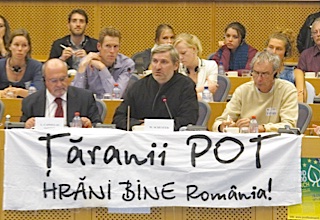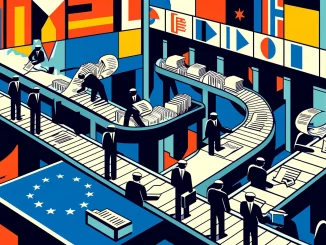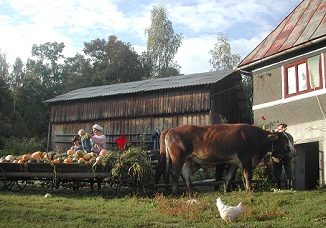When there are compromises to be made in the coming CAP reform talks, they should be transparent, European agriculture commissioner Dacian Cioloș told the ARC2020 and Slow Food conference at the European Parliament in Brussels on Wednesday 19th September. “The CAP will be as legitimate as we can make it,” he pledged.
Cioloș suggested that consumers need to vote with their purses when out shopping. If people want to see organic or fair trade or welfare products on the shelves, they need to buy them when they see them, too.
The real world problem, as MEP and rapporteur Capoulas Santos was to point out later, is that in France half a million farmers supply 10,000 food manufacturers and seven national retail chains. The exact figures vary across Europe, but the proportions do not vary widely. The retail stranglehold over the food market is such that retailers act as gatekeepers and decide what they will list for their customers.
Urban populations have been isolated from food production, often for generations and are totally dependent on retailers as a result. Because retailers make it so easy to spend money in their stores, consumers need a firm resolve or some other strong reason to consider shopping in alternative channels.
Addressing the conference from New York in a video message, The United Nations Special Rapporteur on the right to food, Olivier de Schutter told delegates that 30 years of dependency on food imports left Europe vulnerable rather than anything else. “Promoting export-led farming is dangerous for all concerned,” he warned.
The land needed to grow EU food imports is 35 million – equivalent to the surface area of Germany, he added. Local food production is capable of being the bedrock of local communities, as it has been in the past.
“We need to promote urban and peri-urban agriculture,” De Shutter explained, adding that local short-circuit systems like veggy boxes in the UK or AMAP(s) in France and Canada are thriving. As well as supplying fresh produce in peak condition, direct selling both rebuilds the gap between consumer and farmer (an issue which concerns Cioloș too) and builds strength and resilience into a local economy. “The EU could lead the way by being an example and making a paradigm change,” De Schutter concluded.

Later in the conference, Willy Schuster, a Romanian peasant leader gave a personal account of what EU membership had entailed for his village, as foreign businesses crowded out existing Romanian local producers. Symbolically putting on his black mourning jacket before explaining that Romanian farms are being killed off by multinationals.
Romanian farmers are being locked out of the market, he explained: “People afraid to buy raw milk and they are being told lies about it. The EU is protecting people from good food. Before joining the EU, there were 400 cows in our village: today there are about 40,” he added.
If there was any doubt in the room as to the ways in which small farmers are manipulated by the current form of the CAP, a dairy farmer from Picardy questioned the way in which contracts are used to control producers. “[At present] I have to negotiate with my [privately-owned] processor for milk collections over the coming year for production that has taken at least three years to put in place. There a lot at stake for me.”
While milk producers risk everything to get a price for their output, the businesses they supply are working to a different agenda. “It’s no wonder that dairy farmers drop their guard and take what is on offer!” the Picard producer exclaimed.
Across the room, a Breton dairy farmer took up the point about the way contract prices are determined. “If we could get a price that covered our production costs, we’d sign up for a contract like that tomorrow!” she retorted.
Despite the apparent gulf between town and country interests, urban consumers can play a role if they organise. A member of the Slow Food Youth, Sam Levie, told the conference that when Dutch retailer Albert Heijn planned a 2% cut in what it expected to pay suppliers, the group organised Twitter and Facebook campaigns. Within two days the retailer had been shamed into dropping its plan.
“Mobilising means voting with our forks. We want to be involved in the CAP discussion,” he added. In reality, there is no separation between food and land.






